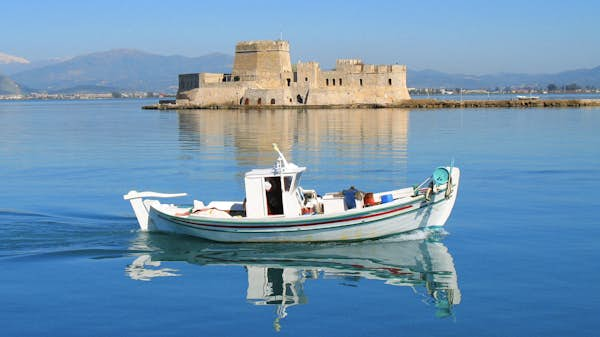Who hasn’t dreamed of going to Greece?
The fabled country inspires travelers with its peerless culture and art, food, outdoor adventures, and (of course) beaches and islands. And since any trip goes a little better with a little planning, we’ve put together a list of 14 ideas we think any traveler would benefit from knowing.
From when and were to book to local etiquette to health and safety issues once you’re there, here’s everything you need to know to plan a memorable trip to Greece.
1. Investigate whether you need a visa or not
Greece, a European Union member, lies within the Schengen Zone, which allows its citizens to travel among 27 states (all but four within the EU) without a visa. Beyond this zone, citizens of more than 60 countries are permitted to travel to Greece visa-free for a total of 90 days within a 180-day period (Greece’s Ministry of Foreign Affairs has the full list). If you’re a citizen of a country not on the list, you’ll have to apply for a Schengen visa. Here’s where to learn more about visa requirements to Greece.
Advertisement

2. Consider the pros and cons of each season
Your experience in Greece will be wildly different depending on when you visit. Summer is tops for action, family fun and swimming in the Mediterranean Sea – but prices are at their highest and booking ahead for everything is a must since it’s all so popular.
The shoulder seasons (spring and autumn) are a delight with lower prices, and rooms and resources less in demand. Winter offers a moody and budget-friendly retreat, great for walking, hiking and low-key exploring; you will often be the only visitor around. Bear in mind that some businesses will shut down completely during the low season.
3. Focus on the right island or region for you
Greece merits multiple trips as every island offers something different, and each of its regions is equally dazzling. You’re never going to see everything on your first visit, and you’ll ruin your trip if you pressure yourself to do just that.
While during a longer trip (10 days or two weeks, say) you can cover many not-to-be-missed highlights all over Greece, we’d recommend thinking through your travel wishes and priorities as you plan. Consider homing in on two or three islands (or even just one), or a single, rich region, like the Peloponnese. Or read up on can’t-miss ancient sites, and craft an itinerary that will bring Greece’s stunningly rich history to life.
And don’t be fooled that the biggies are the only islands worthy of your attention. Though Mykonos, Santorini and other famous places have plenty to offer, lesser-known islands (there are hundreds!) like Amorgos or Kythira are also a delight. They’ve also got the added bonus of smaller crowds and lower prices.

4. In peak season, book well ahead
During the peak weeks of July and August, prices are high, and demand for car rentals, accommodations and ferry tickets is even higher. Simply put, this is not the time for ad-hoc bookings on the fly. Greece is an incredibly popular summer destination, and the best options get snapped up well in advance.
5. Pack the right kinds of clothing
You’ll find that Athenians are well-dressed, and the younger crowd trendy – so keep your smart clothes for the urban catwalk of clubs and bars. Even so, in Athens and other metropolises such as Rhodes, Thessaloniki and Iraklio, everyday attire such as shorts or jeans and casual tops is just fine.
Advertisement
Bars or fashionable restaurants require more effort, with a scene that’s stylish rather than dressy: think tops and trousers rather than t-shirts and cut-offs. In more out-of-the-way places, you can wear casual clothing. And in summer, the heat will make you want to wear the least amount of fabric you can get away with – so you won’t regret packing quick-drying tank tops and cool dresses.
Sturdy walking shoes are a must for the cobbled roads, and proper hiking boots are key if you’re exploring the countryside on foot. Wherever you find yourself in the country, it’s respectful to cover up before entering churches.
6. Athens isn’t the only gateway to Greece
Many travelers transit in or out of Greece via Athens, as its airport has connections with numerous international destinations, and the city itself is a gem. Yet other airports on the Greek mainland (such as in Thessaloniki) and on some major islands (such as Mykonos, Santorini and Corfu) also offer international connections.
If you need any internal flights to get to your destination of choice, it’s worth pricing out these legs one by one. Due to government subsidies, you might see significant savings by booking each part of your intra-Greek itinerary separately from your international flights.

7. You need confidence to take to Greece’s roads
No one who has dodged crazed drivers on Greece’s roads will be surprised to hear that Greece’s road-fatality rate is one of the highest in Europe, with reckless passing listed as the greatest cause of accidents. If you can keep your cool during the inevitable heart-stopping moments, having your own car is a great way to explore off the beaten track. Yet you will need to be confident in your driving, and keep a few key points in mind.
-
The road network has improved enormously in recent years; many roads marked as dirt tracks on older maps have now been paved, and a lot of the islands have very little traffic.
-
Regular (if costly) car-ferry services serve almost all islands.
-
Greece is not the best place to initiate yourself into motorcycling. If you’re not confident on a motorbike, we suggest parking this option until you have more experience.
-
All the big multinational car-rental companies are represented in Athens, and most have branches in major towns and popular tourist destinations. The majority of islands have at least one outlet.

8. Beyond Athens, Greece is not very wheelchair-friendly
Though access for travelers with disabilities has improved somewhat in recent years, the majority of Greece’s accessible sights, hotels and restaurants tend to be located in Athens. Much of the rest of Greece remains inaccessible to wheelchairs, and the abundance of stones, marble pavers, slippery cobbles and stepped alleys create frustrating barriers for those with mobility issues. People who have visual or hearing impairments are also rarely catered for, alas.
Still, careful planning before you set out for Greece can make a world of difference. There are specific resources online that provide links to local articles, resorts and tour groups catering to tourists with physical disabilities.

9. Learn a few basic Greek phrases
Though Greek is a challenging language to learn, picking up a few basic greetings and niceties will make a world of difference in how locals receive you. In touristed areas, many people speak English – so rest assured that you can get by even if you’re shaky on those Greek phrases.
10. Don’t rely on cards or ATMs – and have euros on you at all times
You’ll find ATMs in every Greek town large enough to support a bank, and in almost all the tourist areas. Yet regular travelers know that ATMs on the islands can lose their connection for a day or two at a time, making it impossible for anyone (locals included) to withdraw money. It’s useful to have some backup cash just in case this happens during your visit; consider withdrawing more euros than you need when you visit a working ATM.
Credit cards are now an accepted part of the commercial scene in Greece, although they’re often not accepted on many of the smaller islands or in small villages. Don’t rely on your cards alone, and verify in advance that the restaurant or bar you have in mind takes them if you feel uncomfortable carrying large amounts of cash.
In Greek restaurants, a service charge is normally included in the bill, and while a tip is not expected, it is always appreciated. Taxi drivers normally expect you to round up the fare, while bellhops who help you carry your luggage to your hotel room or stewards on ferries who take you to your cabin normally expect a small gratuity of between €1 and €3.
11. Consider buying good travel insurance
Although medical training is of a high standard in Greece, the public health service is underfunded. Hospitals can be overcrowded, with relatives expected to bring in food for patients – an obvious problem for solo travelers. Conditions and treatment are much better in private hospitals, which are expensive. All this means that a comprehensive travel-insurance policy is essential.
There is at least one doctor on every island, and larger islands have hospitals. As in most European countries, pharmacists in Greece can usually dispense medicines that are available only by prescription. If you have a health situation that‘s not critical, we recommend making a pharmacy your first stop.

12. Stay hydrated, and remember the sun’s strength
Tap water isn’t safe to drink on many islands; if in doubt, ask. Keeping a supply of bottled water to hand is essential for hydration as well as safety. Many tourists underestimate how hot it can get in Greece, and heatstroke and serious sunburn are common on beaches with little shade.
Break up your sun sessions with siestas in the shade and frequent water breaks, and pack plenty of high-SPF sunscreen. Even though mosquitos are an irritant rather than a danger in Greece, packing insect repellent is recommended.
13. Pickpocketing and other petty crime is common in busy places
Visitors to Greece need to stay aware of the dangers of pickpockets in the large cities, and the theft of belongings when lounging on busy, popular beaches (always leave passports behind in hotel safes). Never leave your belongings unattended, and don’t leave your bags hanging from the back of your seat where you can’t keep an eye on them.
A dedicated tourist-police force works in tandem with the standard Greek police. Each tourist-police office has at least one member of staff who speaks English. If you need to report a theft or loss of passport, go to the tourist police first, and they will help you interface with (which at a minimum means interpreting for) the regular police.
Some unscrupulous taxi drivers will try to charge you extortionate rates from the airports to the city centers. Always make sure the meter is running, or pre-negotiate and agree on the price before you get in.

